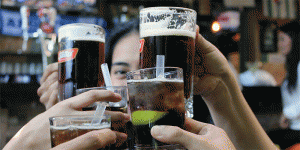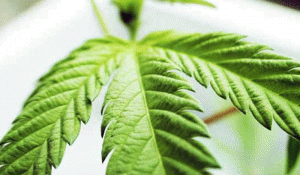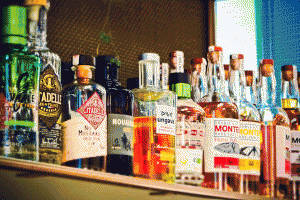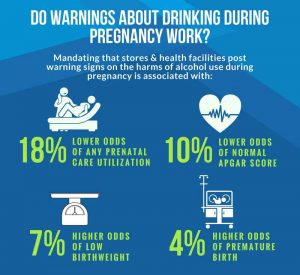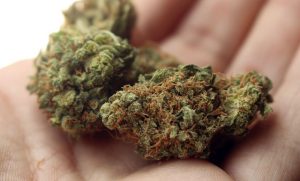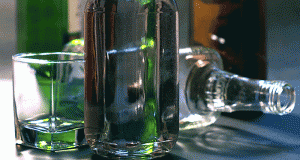Study shows efficacy of digital tool as a harm reduction strategy A new study from ARG Scientist Madhabika Nayak and colleagues found that women who were risky drinkers and completed an electronic screening and brief intervention (e-SBI) program called DrinkWise significantly reduced their weekly alcohol use and heavy alcohol use at the six-month follow up, compared to those who did not complete the program. This is the first non-intensive (single session), self-administered e-SBI in English … [Read more...]
Recent Findings
People with AUD may be able to substitute cannabis for alcohol
New study links moderate cannabis use to persistent alcohol problems; finds no association for heavier or lighter use People with a lifetime alcohol use disorder (AUD) who used cannabis moderately had 2.83 times the number of drinks and experienced 6.82 times greater odds of alcohol-related harms than abstainers, according to a new study from ARG biostatistician and lead author Meenakshi Sabina Subbaraman and colleagues. Mid-level cannabis users also had an increased number of heavy … [Read more...]
Recent increases in alcohol consumption may be higher than previously reported
New study finds a more accurate way to measure per capita alcohol consumption that accounts for changes to how much alcohol is in beer, wine, and spirits The way we currently measure how much alcohol each person is consuming may be less accurate than previously thought, according to a new study from the Alcohol Research Group, a program of the Public Health Institute. The study authors offer a new way to determine per capita alcohol consumption that accounts for changes to the alcohol content … [Read more...]
Violent Crime Linked to Liquor Stores
A 10% increase in access to alcohol outlets was significantly associated with a 4.2% rise in violent crime in Baltimore, MD, a new study from ARG postdoctoral fellow Pamela Trangenstein found. Trangenstein and her team from Johns Hopkins also assessed whether the type of outlet made a difference, with results showing that greater access to off-site outlets was associated with a 4.4% increase in violent crime compared to 3% for on-site. This is the first ecologic study in the U.S. to use spatial … [Read more...]
Stricter policies & alcohol-related injuries
Stricter policies linked to lower rates of alcohol-related injuries International study finds government restrictions on drinking curbs injuries despite alcohol use rates and patterns Emeryville, CA (June 27, 2018): Countries with stricter alcohol policies had lower rates of alcohol-related injuries, regardless of individual consumption rates and drinking patterns, and country-level drinking patterns, a new study from the Alcohol Research Group (ARG), a program of the Public Health … [Read more...]
Policies Tied to Worse Birth Outcomes
Policies targeting alcohol use during pregnancy tied to worse birth outcomes New study suggests even “supportive” policies lead women to delay or avoid prenatal care Emeryville, CA (June 18, 2018) – A majority of state-level policies targeting women’s alcohol consumption during pregnancy—even policies designed to support pregnant women—lead to more adverse birth outcomes and less prenatal care utilization, according to a new study from ARG and Advancing New Standards in Reproductive Health … [Read more...]
Cannabis Use up Slightly Post Legalization
New study finds only slight increase in cannabis use after legalization Residents of Washington State now seem more likely to report prior use A new retrospective assessment of cannabis use in Washington State by the Alcohol Research Group, a program of the Public Health Institute, found only a 1.2 percentage point increase in past year use after recreational marijuana was legalized, from 24.3% to 25.6%. The new findings published in the Journal of Studies on Alcohol and Drugs suggest that a … [Read more...]
Alcohol Treatment & Social Status
Undergoing alcohol treatment does little to improve social status Despite some improvement in the first year, a new study found no significant improvement in a person’s social status during the seven years after completing alcohol treatment. Social status in the years after completing treatment was worse for those who had ongoing alcohol problems or who also had drug or psychiatric problems. Social status was based on unemployment, incarceration, homelessness, and living in an impoverished … [Read more...]
Poverty, Lack of Education & Alcohol Problems
Poverty and lack of education contribute to later onset of alcohol problems A new longitudinal study found that when assessing heavy drinking patterns among people in their 30s, Blacks were at a greater risk for developing drinking problems than Whites. Whites tended to age out of heavy drinking after young adulthood. However, when measures of poverty and education were included in the analyses, Blacks had similar risks of drinking problems to Whites. “Our findings suggest that Blacks may … [Read more...]
Cultural Shifts in Women’s Drinking
New study finds cultural shifts in how much women drink and the reasons why some don’t A new 10-year study found changes in the amount women drank and why some abstained from drinking that varied across racial/ethnic groups and by age. Between 2000 and 2010, abstinence among White and Black women over age 40 decreased, while at-risk drinking among White women of the same age increased. The study defined at-risk drinking as consuming more than three drinks on any day or more than seven drinks … [Read more...]
- « Previous Page
- 1
- …
- 3
- 4
- 5
- 6
- 7
- 8
- Next Page »
